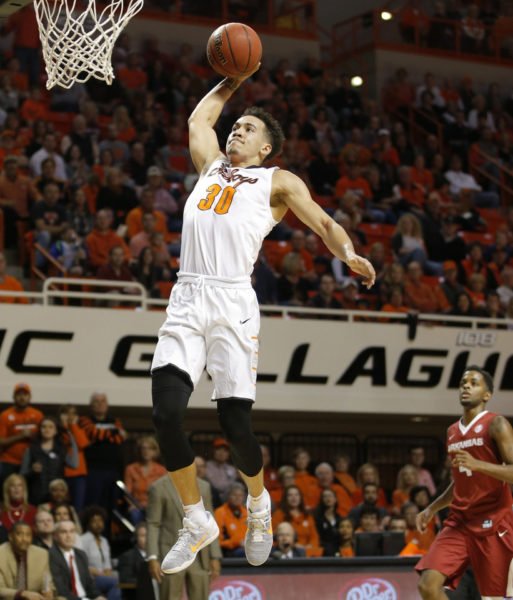Big 12 Burning Questions: Oklahoma State Cowboys
Posted by Brian Goodman on October 19th, 2017This preview is part of RTC’s Big 12 preseason coverage.
Will Mike Boynton follow the recent trend of first-year Big 12 coaches fielding competitive teams?
In spite of some recent March slip-ups, the Big 12 maintains its reputation as the most competitive, if not the best, basketball conference in America. It routinely sends at least half of its membership to the Big Dance, propels a number of top-flight prospects to the NBA Draft, and contributes experienced players to postseason All-America teams on a regular basis. One byproduct of all that competitiveness that isn’t discussed as much is that for a conference so small relative to the rest of the Power 5, the Big 12 has witnessed a staggering amount of coaching turnover in the past few years.

Jeffrey Carroll will be one of the most dynamic scorers in the country, but the Cowboys will struggle to stay competitive in the cutthroat Big 12. (Bryan Terry/The Oklahoman)
Five Big 12 teams have made six head coaching changes since the start of the 2016 offseason, with a handful of that group achieving success with their new teams in relatively short order. Last season Brad Underwood led Oklahoma State to its first .500 conference record since 2013. Similarly, buoyed by a more committed TCU administration, Jamie Dixon led the Horned Frogs to as many league wins in 2017 (6) as they had notched in the last three seasons combined — riding that wave all the way to the NIT title. Going back another year, Steve Prohm led Iowa State to just its second Sweet Sixteen of the last 18 years in 2016. The Chris Beard and Shaka Smart eras at Texas Tech and Texas, respectively, have been works in progress, but both of their teams should be better this year. No one knows what the FBI’s investigation of the Oklahoma State program will bring, but at least until then, Mike Boynton will have a team to coach. Still, given what he has at his disposal, it will be tough for the new head coach in Stillwater to match the strong campaigns from some of the league’s recent first-year coaches.
First, Boynton has never been a head coach, cutting his teeth as an assistant for Frank Martin at South Carolina and Brad Underwood at Stephen F. Austin in addition to last year at Oklahoma State. Apparently not learning the lesson in allowing Illinois to snatch Underwood from the program last March, the administration went cheap on his replacement. Maybe athletic director Mike Holder knows something we don’t, but seeing as how Boynton had never been linked to a major head coaching job prior to his promotion, it’s fair to question his acumen (although it could have been worse — among Oklahoma State’s other candidates was also former assistant Lamont Evans, who was charged in last month’s NCAA corruption scandal and fired shortly thereafter).
It won’t be a full-on rebuild at Gallagher-Iba this year, but it will be pretty close. The losses of Jawun Evans and Phil Forte are substantial, but neither came as a surprise. From the midpoint of Evans’ freshman season, it was clear that he wasn’t going to be long for the college level, and Forte had to eventually run out of NCAA eligibility. The Pokes’ top returnee will be wing Jeffrey Carroll, who made a leap from being a long-range gunner in 2016 to the nation’s 12th-best offensive player in 2017, according to KenPom. Carroll gives the Cowboys a definitive offensive centerpiece who should lead the league in scoring — an asset that the vast majority of first-year head coaches don’t have.
Of course, one reason why Carroll will be expected to score so much is because he won’t have much help. Evans and Forte shouldered 47 percent of the team’s scoring load last season, but they’re no longer available. That’s one area where Kendall Smith — who comes to Stillwater as a graduate transfer from Cal State Northridge — will be expected to help. Smith averaged 16.7 points per game for the Matadors last season, while leading the Big West in assist rate at 28.4 percent and proving capable from deep at 34.5 percent. In a small sample of games against high-major teams, Smith also showed he could handle it with strong outings against UCLA and Stanford. Sophomore Brandon Averette figures to spell Smith as he did Evans in 2016, while Lindy Waters will look to prove that he’s fully recovered from a foot injury that hobbled him as last season drew to a close.
Down low, Mitchell Solomon doesn’t offer much in the way of scoring, but he is an elite offensive rebounder and top-100 shot-blocker nationally. Behind him is where things get murky. Seven-footer Lucas N’Guessan struggled to stay out of foul trouble during his freshman season and St. John’s transfer Yankuba Sima won’t be eligible until the end of the first semester. While talented, Cameron McGriff, Tavarius Shine and Davon Dillard are all either inexperienced or better suited for the perimeter.
Carroll, Smith and Solomon are all legitimate Big 12 talents, but while the rest of the team has potential, the ceiling appears relatively low with this group. Add that to Boynton’s inexperience on the sideline and it’s tough to predict anything other than a bottom-tier finish for the Cowboys.











































